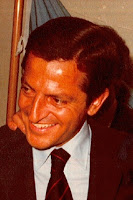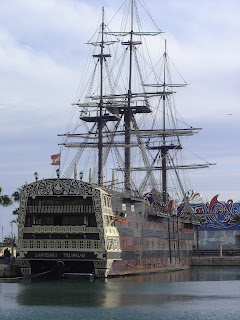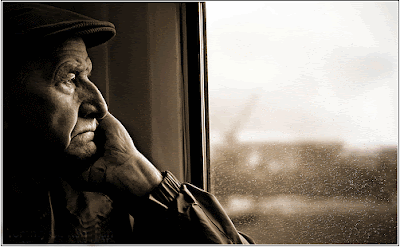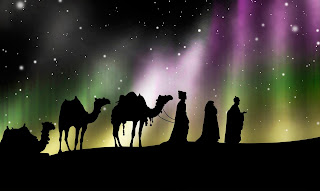A Brief History of Spain .... Come on ... We do live here!!!
Most of the Iberian Peninsula has been populated since prehistoric times. Early evidence of human habitation unearthed at the Atapuerca site in northern Spain are some 800,000 years old. Modern man made his appearance around 35,000 BC. Sometime around 4000 BC, much of Spain was settled by the Iberians, arriving from the east. The Celts arrived later, settling in the northern third of the peninsula. Bronze age civilization flourished in the south, culminating with the Tartessian civilization around Seville (1000-500 BC).
Around 1100 BC, Phoenician seafarers from present-day Lebanon set up trading colonies in Cadiz and elsewhere along the Spanish coast. Phoenician Greeks also traded along the north-eastern coast. With the fall of Phoenicia, the Iberian Peninsula came under the rule of Carthage (present day Tunisia), but was occupied by Rome following the Punic Wars. The Romans held sway in Iberia for six centuries, laying the foundations for Spanish language and culture.
Following the fall of the Western Roman Empire in the fifth century AD, Spain was ruled by the Visigoths, a Germanic people who had migrated from central Europe. In 711, the Muslims of northern Africa launched an invasion across the Strait of Gibraltar, occupying most of the peninsula within a few years. Their presence lasted more than seven centuries, though the Christian kingdoms to the north increased in power over the generations, gradually driving the Moors southwards. The last Moorish kingdom, Granada (the eastern half of present-day Andalusia), was conquered in 1492.
The discovery of the New World by Christopher Columbus and the expulsion of Jews and Moors from Spain were to mark Spanish history forever. Treasure from Spain's vast overseas empire pushed Spain into the forefront of European countries, but constant warfare drained resources. With the accession of the Bourbon dynasty to the Spanish throne at the beginning of the 18th century, Spain came within the French sphere of influence for the following 100 years, up to the defeat of Napoleon's army during the Peninsular War.
During the 19th century, Spain was sharply divided between conservatives and liberals, and rural and urban society. Coups d'etat and changes of government were frequent. With the increasing power of the working class, in 1931 king Alfonso XIII was forced to abdicate, and Spain was declared a republic. Conservative reaction from the church and army sparked the Spanish Civil War, which raged from 1936 to 1939 and was a prelude to World War II. Under the dictator Franco, who had been sympathetic to the Axis powers, Spain was ostracized from the community of nations until it became strategically attractive to the US during the Cold War. The first US bases opened in the 1950s. Spaniards working abroad and tourists arriving in increasing numbers brought in foreign revenue and fuelled the emergence of a large middle class. When Franco finally died in 1975, the accession of King Juan Carlos to the throne and the transition to a democratic state were relatively smooth.
Presidents of the Government under Juan Carlos I (1975 – present)
Photo | Name | Term of office | End of office | Party |
Adolfo Suárez González (1932– ) | 5th July 1976 | 29th January 1981 | ||
First democratic Prime Minister of Spain; Appointed by King Juan Carlos I in 1976; Law for Political Reform; Spanish transition to democracy; 1977 Massacre of Atocha; First free and democratic Spanish elections in 41 years; Spanish Constitution of 1978. 1980s economic crisis. Legalization of divorce. Resigned due to internal crisis, struggle and lack of support within his own party. | ||||
Leopoldo Calvo-Sotelo y Bustelo (1926–2008) | 25th February 1981 | 1st December 1982 | ||
Acting Prime Minister, January 29—February 25, 1981; 1981 Spanish coup d'état attempt, UCD break up and heavy defeat in the 1982 general elections. | ||||
Felipe González Márquez (1942– ) | 1st December 1982 | 5th May 1996 | Spanish Socialist Workers' Party PSOE | |
Longest-serving Prime Minister of Spain to date; Largest landslide victory in a Spanish election; Legalization of abortion; Increasing of personal freedoms; Reorganization of the education; Grupos Antiterroristas de Liberación (GAL); 1985 El Descanso bombing; Spanish NATO membership referendum, 1986; 1987 Hipercor bombing; Spain's accession to the European Economic Community; Liberalizing of economic policies; 1988 general strike; FILESA case; 1991 Vic bombing; 1992 Seville fair; 1992 Summer Olympics, 1993 economic crisis | ||||
José María Aznar López (1953– ) | 5th May 1996 | 17th April 2004 | ||
First People's Party PM; Privatization of public enterprises; ETA killing of Miguel Ángel Blanco; Abolishment of compulsory military service; Spanish accession to the European single currency; 2002 general strike; 2002 Perejil Island crisis; Reform of university studies by decree; Application of the National Hydrological Plan; Prestige incident; Commitment of troops to Afghanistan and Iraq wars; Banning of Batasuna; 2004 Madrid train bombings. | ||||
José Luis Rodríguez Zapatero (1960– ) | 17th April 2004 | 21st December 2011 | ||
Withdrawal of Spanish troops from Iraq; Same-sex marriage legislation; ETA's 2006 ceasefire declaration; 2006 Madrid-Barajas Airport bombing; 2008–2011 Spanish financial crisis, whose effects (high unemployment rate, large budget deficit) forced Zapatero's government to approve a series of austerity reforms (overhaul of the labour market, raising of the retirement age from 65 to 67) resulted in the 2011 protests); Early 2010s European sovereign debt crisis; Arab Spring and NATO military intervention in Libya; ETA's announces permanent end of armed activity. | ||||
Mariano Rajoy Brey (1955 -) is the current Prime Minister. He represents the People's Party (PP) and won the second largest landslide visctory for a Prime Minister candidate in a Spanish Election.









Comments
Post a Comment